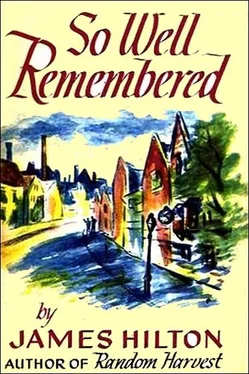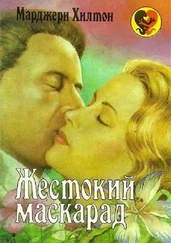Джеймс Хилтон - So Well Remembered
Здесь есть возможность читать онлайн «Джеймс Хилтон - So Well Remembered» весь текст электронной книги совершенно бесплатно (целиком полную версию без сокращений). В некоторых случаях можно слушать аудио, скачать через торрент в формате fb2 и присутствует краткое содержание. Год выпуска: 1945, Жанр: Проза, на английском языке. Описание произведения, (предисловие) а так же отзывы посетителей доступны на портале библиотеки ЛибКат.
- Название:So Well Remembered
- Автор:
- Жанр:
- Год:1945
- ISBN:нет данных
- Рейтинг книги:5 / 5. Голосов: 1
-
Избранное:Добавить в избранное
- Отзывы:
-
Ваша оценка:
- 100
- 1
- 2
- 3
- 4
- 5
So Well Remembered: краткое содержание, описание и аннотация
Предлагаем к чтению аннотацию, описание, краткое содержание или предисловие (зависит от того, что написал сам автор книги «So Well Remembered»). Если вы не нашли необходимую информацию о книге — напишите в комментариях, мы постараемся отыскать её.
So Well Remembered — читать онлайн бесплатно полную книгу (весь текст) целиком
Ниже представлен текст книги, разбитый по страницам. Система сохранения места последней прочитанной страницы, позволяет с удобством читать онлайн бесплатно книгу «So Well Remembered», без необходимости каждый раз заново искать на чём Вы остановились. Поставьте закладку, и сможете в любой момент перейти на страницу, на которой закончили чтение.
Интервал:
Закладка:
George answered gravely: “Aye, you’ve a right to ask. I’m quite ready to take blame for plenty that I did—and plenty that I didn’t do. I can see now, like a lot of folks, that I was living in a fool’s paradise— if by any stretch of imagination you can call Browdley any sort of paradise. Maybe if I’d had a better education—”
“Depends on what you call a better education.”
“I daresay I’d call yours one. What was it—Eton and Oxford?”
“No. Charterhouse and Cambridge… and also Berlin.”
“WHAT? You were educated in BERLIN?”
“Not IN Berlin—OVER Berlin.” And then the boy laughed rather wildly. “Sorry. I’ve been waiting to work that off on somebody, but you were the first to give me a cue.”
George smiled. “I see what you mean.”
“You ought to. After all, you were at the University of the Somme yourself.”
“Aye, but don’t let’s be over-dramatic. War doesn’t teach anybody much —except to hate it. If you hate it beyond a certain point you go out of your mind, so if you don’t want to do that you have to forget it somehow or other, and I suppose that’s mostly what I and millions of others did.” George paused a moment before taking a further plunge in intimacy: “And that’s what you’ll do too, my lad, unless you’re the exception that proves the rule. Maybe you are. But if you aren’t… well, there’s a maternity ward next door for you to think of. Aren’t you afraid that some day all those kids will blame you as you’re blaming me—not personally, but as a generation?”
“A damned hard question, and the answer is yes, I AM afraid. I’m scared stiff… and I’m not hopeful. But what the hell can I do? Lads of my age, as you call them, have the war to win first, before we can bother with anything else. Give us a chance to do one thing at a time, for Christ’s sake.”
“Give US a chance, then, too—even if it’s only a chance to help you. Some of us still have one foot out of the grave.”
The door opened and the nurse entered. She had heard the raised voices and the laughter-sound as she walked along the corridor, and now she was in time to catch George’s last sentence. It must have seemed to her a strange conjunction, justifying the acerbity with which she approached the wheel-chair, whipped out a thermometer, and said to George: “You mustn’t make him laugh, Mr. Boswell—it would be very bad for the new skin. And you really have talked to him enough, I think… if you don’t mind…”
It was true; it was the longest time George had yet stayed. “I understand,” he said, smiling to both of them.
Charles then asked the nurse if she would fetch him some more of the lozenges.
She went out exclaiming: “My goodness, Lieutenant, have you used them up already?”
“Seems like it, nurse.” Then, when the door closed, he turned quietly to George. “Just a moment—before you go. I wanted to say this, but we got talking about so many other things… I’ve had the tip they mean to transfer me somewhere else—for facial surgery and what not. Probably before you come again… so if they do, and I send you my new address, would you—would you have the time—to—to write to me— occasionally?”
George laid his hand on the boy’s shoulder. “Aye,” he answered. “I will that.” The long argument had given him such mental stimulation that now emotion came to him with an impact; after those four words he was speechless, stricken at the sudden thought of an end to the visits.
The nurse came hurrying back with a fresh bottle of lozenges, then spied one still half-full on the table beside the bed. “Well, I do declare— you didn’t finish the others after all! He’s so absent- minded, Mr. Boswell… Aren’t you, Lieutenant?”
George stammered his goodbyes, and wondered as he left the hospital what was the matter with him to have used up so much time in talking politics. Of course it was the mere zest of a debate that had led him on, exhilarating him as it always did—recalling the remark once made by a teetotal friend that drink would have been wasted on George, since a good hard-hitting argument produced on him the same effects, even to the hangover the next day, when he wondered what he had said in the heat of the moment that might have given offence, or that he didn’t exactly mean.
But now his emotions were of a different kind. Sadness grew in him all the way back to Browdley, coupled with and finally outweighed by a breathless satisfaction that the boy had asked him to write. Of course he would write.
Winslow was transferred during the following week to a hospital in the South of England, where specialists were reputed to work miracles with skin and cartilage; but it was not of this that he wrote in his first letter to George. He wrote:
“DEAR MR. BOSWELL—Just a line to let you know my new address. I expect to be here several months, as the work they do here takes time—and patience too, I expect, by all concerned. The men call it the beauty shop. But the main thing I have to tell you is about my mother. I’ve had news that she is among those to be repatriated from a Jap prison-camp. The Foreign Office sent me word a few hours ago, and though they couldn’t give me any information as to how she is, or about my father at all, it certainly is great news that she is actually out of enemy hands and on the first stage of her way home. They don’t expect her to arrive for at least six or eight weeks, as the ship is slow and has to take a roundabout route. By that time I hope to be well enough myself to meet her—though the doctors here only smile when I say it. I’m a bit stubborn, though, when I set my mind on anything, which is a quality I inherit from her. Incidentally, I’d like you to meet her, because I’m sure she’ll want to thank you personally for your great kindness to me while I was at Mulcaster…”
When George took this over to Wendover the latter read it through and turned on his friend a somewhat quizzical expression. “Well, George,” he commented at length, “it settles one thing.”
“Aye, I’ve got to tell him.”
Wendover nodded. “And quickly too. You don’t want him writing to HER about you.”
“I don’t see how he could.”
“There might be some port of call where he could send air-mail.”
“That’s so. Anyhow, I agree with you. Spill the beans and get it over. Might even have been better to tell him in the first place.”
“One of the penalties of being too subtle, George. I could never quite make out what your aim was—or still is, for that matter.”
“My AIM?”
“Yes—in regard to the boy.”
George answered: “I haven’t got an aim—except that I’d like to help him because I like him. I never realized how much I like him till now that I can’t see him. And I don’t think it’s because he’s Livia’s boy— it’s because I like HIM. He’s a fine young chap—and a brain too… But I suppose it’ll be an impossible situation when Livia gets back.”
“It might be. You’ll have to take that chance. But take it now—by telling him.”
“Aye, I will. I’ll write tonight.”
George wrote a short letter containing the simple fact, and received in reply by return the following:
“DEAR MR. BOSWELL—What a hell of a surprise! I’ll admit you could have knocked me down with a feather, as they say. I’m a bit puzzled why you didn’t tell me earlier, but perhaps it doesn’t matter. Of course I’d known that my mother was previously married, but I was never told any of the details. Frankly, the whole thing makes no difference to me, but of course it may to her when she gets here. I don’t want to worry her, because from what I hear and can guess, she must have had a pretty bad time…”
Читать дальшеИнтервал:
Закладка:
Похожие книги на «So Well Remembered»
Представляем Вашему вниманию похожие книги на «So Well Remembered» списком для выбора. Мы отобрали схожую по названию и смыслу литературу в надежде предоставить читателям больше вариантов отыскать новые, интересные, ещё непрочитанные произведения.
Обсуждение, отзывы о книге «So Well Remembered» и просто собственные мнения читателей. Оставьте ваши комментарии, напишите, что Вы думаете о произведении, его смысле или главных героях. Укажите что конкретно понравилось, а что нет, и почему Вы так считаете.










